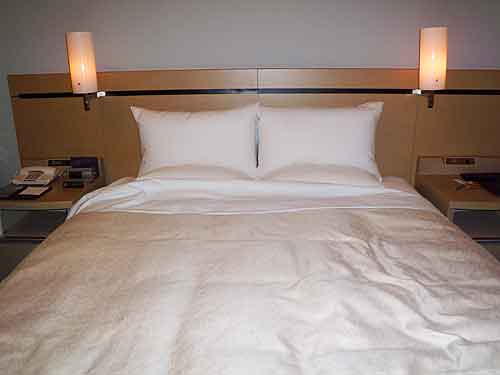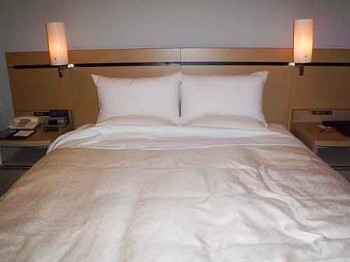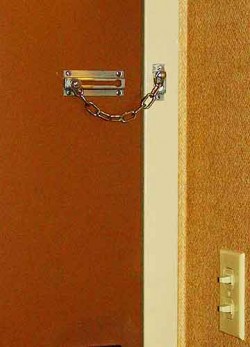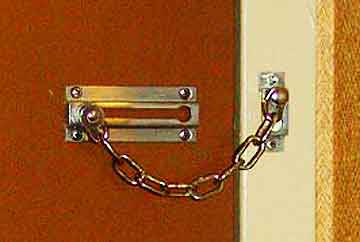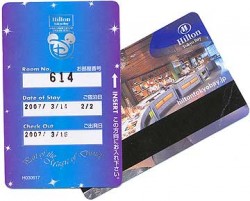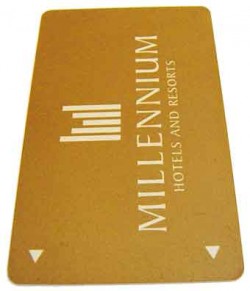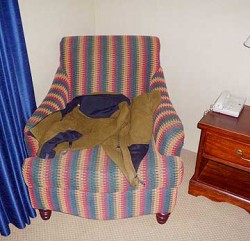How to do a hotel room security check
[dropcap letter=”B”]ob and I sleep more nights in hotels than in our own home and, to date, we have never been ripped off in a hotel room. True, we use a certain amount of care, but our laptops are usually left out and sometimes valuables are more hidden than locked. We stay in hotels ranked from six stars to no stars, depending on our sponsors and our intentions. In each hotel room, we make a quick and automatic assessment of risks and adjust our behavior to correspond. We have never walked out of a hotel* because of hotel room security issues; we simply adopt the necessary precautions.
The room key: we prefer electronic card keys. Old-fashioned metal keys can be copied, and where might copies be floating around? Electronic locks are usually recoded after each guest. Most electronic locks save records of whose keys have recently gained entry. Authorized keys are registered to their users. So if a guest reports a problem, security can tap into records stored in the lock’s mechanism and see the last ten or so entries, be they housekeeping, an engineer, a minibar man, or the guest himself.
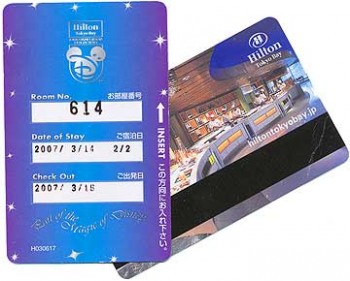
Electronic key cards should not be marked with a room number. They’re usually given in a folder which identifies the room. Leave the folder in the room when you go out and carry just the un-numbered magnetic card. If you lose the key, the safety of your room won’t be compromised.
Some hotels still use metal keys attached to a big fat ornament and expect guests to leave keys at the front desk when going out. I’m not fond of this method for several reasons. First, I prefer privacy and anonymity rather than announcing my comings and goings. In some hotels, anyone can look at the hooks or pigeonholes behind the desk and know if a room is occupied or empty. Second, I don’t care for the delay entailed in asking for the key on returning. I could just take the thing with me, but its design discourages that. So third, I don’t want to haul around a chunk of brass the size of a doorknocker. And finally, these keys are usually well identified with the name of the hotel and room number. Losing it would expose one to substantial risk. When possible, Bob and I remove the key from its chunk and just carry it, re-attaching it before check-out. At other times, we go traditional and turn in the key as the hotel suggests.
Deadbolts and door latches: we like these for hotel room security during the night, but they aren’t universal. In Paris once, two men entered our room in the dead of night. Luckily, we woke up and Bob dramatically commanded them to get out. “Pardon,” they said, “c’est une erreur,” it is a mistake. The strange thing was that they had been standing there whispering for a moment. If it had truly been a mistake, wouldn’t they immediately back out of an occupied room? We should have placed a chair in front of the door beneath the knob.
Peephole in the door: I always look out at who’s knocking on the door, and if there’s no peephole, I ask through the closed door. Minibar? No thanks. Window cleaner? Wait til I check out. Engineer? I’ll call the front desk and find out who and why.
Connecting doors to adjoining rooms: I always double check to make sure they’re locked. They always are.
Windows: this is what I look at first, mostly because I hope they open. If they do open, I need to know about outside access. Is there a balcony? If so, there’s probably access to mine from a neighboring balcony. I’ve spoken enough with Frank Black, a career burglar, to never leave a room with an open balcony door. Frank specialized in burglarizing high-rise apartment buildings, but 21 years in prison has, apparently, retired him from that business. He’s now a respected tattoo artist and children’s book author.
In Florida (and I presume elsewhere, too), a certain subset of cat burglar is called a pants burglar. These creep in at night through open lanai doors, while the occupants are sleeping. They’re named for their beeline to men’s trousers, where they hope to find a wallet. They also visit the dresser top hoping to find, perhaps, a woman’s ring taken off for the night.
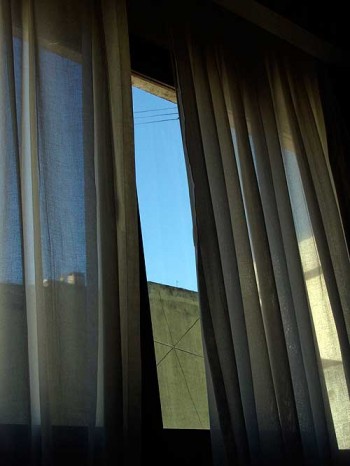
I love an open window, but before I sleep with a breeze, I need to analyze window access. If my room is on the ground floor, on an atrium floor, or if it has a rooftop out the window, I won’t sleep with it open. If there are nearby balconies, forget it. Of course it also depends on the overall ambiance and character of the property. At a safari lodge in Tanzania I’ll worry more about baboons. In a thatched-roof teak tree-house in Bali, I figure I’ve paid enough to expect good security. At an all-inclusive beach resort with rooms that don’t lock—well? I planned for that when I packed.
After a quick appraisal of the hotel room security combined with its overall quality, we know how careful we want to be. In truth, we leave our laptops out in full view in about eighty-five percent of the rooms we stay in. Small valuables? Never. Wallets and jewelry? In the safe.
Some travelers believe in using duct tape to fasten their valuables to the underside of a bedside table, or other furniture. I can’t endorse that practice, unless it’s a last resort.
“During peak travel seasons hotels tend to use a lot of transient help,” Bob Arno says, “and sometimes the screening of these temporary employees is not as high as it could be. So yes, one always has to be concerned about hotel room theft.” The only way to protect your small valuables is to lock them in the hotel room safe.
But is the safe safe? We generally feel secure with electronic safes that allow us to key in our own code or swipe our own magnetic strip. For a magnetic strip, we use an airline or telephone card, not a credit card. The old-fashioned type of safe that takes a regular metal key we do not consider safe and do not use. We’ve surveyed police officers, hotel security, and FBI agents on this issue, and they agree with this reasoning.
Excerpt from Travel Advisory: How to Avoid Thefts, Cons, and Street Scams
Chapter Four: Hotels—Have a Nice Stay
*Once, during a short stay in a Greek hotel, we felt it unwise to leave the things in our room unattended. Had our visit been longer than overnight, we would have relocated.
Much more on hotel room security:
Hotel security in the hands of housekeeping staff
Hotel security: room door left open by housekeeping
Hotel room security lapses
Hotel room theft
Hotel room theft by doorpushers
Hotel Front Desk Safe Theft
Hotel lobby luggage theft
Hotel lobby luggage theft #2
Hotel room safe thefts
Beware hotel phone scam

